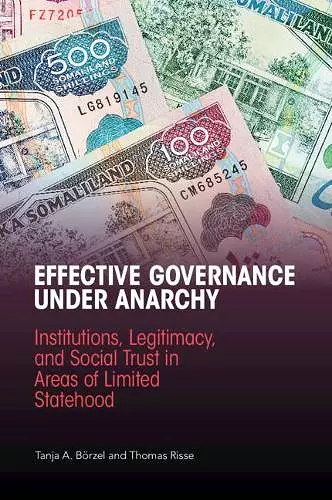Effective Governance Under Anarchy
Institutions, Legitimacy, and Social Trust in Areas of Limited Statehood
Thomas Risse author Tanja A Borzel author
Format:Paperback
Publisher:Cambridge University Press
Published:8th Apr '21
Should be back in stock very soon
This paperback is available in another edition too:
- Hardback£85.00(9781107183698)

Democratic and consolidated states are taken as the model for effective rule-making and service provision. In contrast, this book argues that good governance is possible even without a functioning state.
Policy makers and academics alike have mistakenly promoted an agenda which takes democratic and consolidated states as the model and the goal for effective governance. In reality, Western industrial democracies are the exception, whereas areas of limited statehood are everywhere, and can still be well-governed. The book shows how and why.Policy makers and academics alike have mistakenly promoted an agenda which takes well-governed democratic and consolidated 'Weberian' states as the model for the world and the goal of development programs. Whilst Western industrial democracies are the exception, areas of limited statehood where state institutions are weak and ineffective, are everywhere, and, this books argues, can still be well-governed. Three factors explain effective governance in areas of limited statehood: Fair and transparent institutions 'fit for purpose,' legitimate governors accepted by the people, and social trust among the citizens. Effective and legitimate governance in the absence of a functioning state is not only provided by international organizations, foreign aid agencies, and non-governmental organizations but also by multi-national companies, rebel groups and other violent non-state actors, 'traditional' as well as religious leaders, and community-based organizations. Börzel and Risse base their argument on empirical findings from over a decade of research covering Latin America, the Middle East, Sub-Saharan Africa, and Asia.
'This superb book explores the dimensions of public-private collaborations in politics, and in how this and other relationships lead to the emergence of local and global governance at new levels and in new forms. Locating this exploration firmly in the empirical as well as theoretical, this book offers a compelling critique and alternative to mainstream social science approaches. By focusing on the dynamics of cooperation that spans state and societal, and national and international boundaries, the two authors provide a novel approach to understanding the evolution of the international system. This will be a book that others will have to address, a soon-to-be classic in the field of international relations, as well as in comparative politics for its emphasis on the diverse forms of governance in areas of limited state authority.' William Reno, Professor and Chair of the Department of Political Science, Weinberg College of Arts and Sciences, Northwestern University
'Since the 1990s, the international community has pursued statebuilding as the solution to the problem of fragile states. Borzel and Risse challenge this focus and demonstrate that non-state governance is not only possible but can be effective when would-be governors are competent, legitimate, and trusted. Governance Under Anarchy? is a pathbreaking book that brings insights from the literature on heterogeneous global governance to the question of 'domestic' governance.' David A. Lake, Gerri-Ann and Gary E. Jacobs Professor of Social Science, University of California, San Diego
ISBN: 9781316635049
Dimensions: 229mm x 151mm x 22mm
Weight: 560g
380 pages